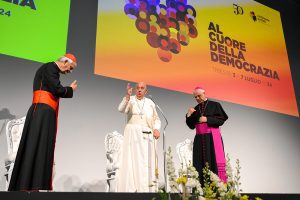VATICAN CITY (CNS) – Catholics are called to be active participants in political life and be a force against the decline of democracy worldwide, Pope Francis said.
“In today’s world, democracy – let’s be honest – is not in good health,” the pope told some 1,200 participants at an event during Italian Catholic Social Week in Trieste, Italy.

The pope traveled to the northern Italian city for a one-day visit July 7 to participate in the four-day conference organized by the Italian bishops’ conference on the theme “At the Heart of Democracy.” The Vatican published his talk the same day.
Speaking in the Generali Convention Center in Trieste, Pope Francis said that “just as the crisis of democracy cuts across different realities and nations,” Christians everywhere are called to develop an “attitude of responsibility toward social transformation.”
The pope criticized the effects on democracy of the “throwaway culture” present in global society in which “there is no place for the poor, the frail, the sick, children, women, the young, the old.” Such a culture makes government structures “incapable of listening and serving people.”
“Whenever someone is marginalized, the whole social body suffers,” he said, comparing the current crisis of democracy to a “wounded heart” which is hurt by the various forms of exclusion.
Pope Francis explained that democracy does not merely entail voting — putting aside his speech to voice his concern about declines in voter turnout — and said “it demands that we create the conditions for everyone to express themselves and participate.” He added that people must be “trained” in democratic participation from a young age and develop “a critical sense regarding ideological and populist temptations.”
The pope warned of the “seductive” nature of ideologies and urged that society cultivate a sense of solidarity to combat them. “Everyone should feel part of a community project; no one should feel useless,” he said
Departing from his prepared remarks, Pope Francis said that the welfare state alone is “the enemy of democracy, the enemy of love for neighbor,” statements that were met with strong applause by the crowd in the convention center.
Certain approaches to welfare and social assistance “that do not recognize the dignity of people are social hypocrisy,” he said, reading again from his text. “And what is behind this distancing from social reality? There is indifference, and indifference is a cancer of democracy, a non-participation.”
To combat indifference and heal the heart of democracy requires widespread participation in political life, the pope said.
A “healed heart” of democracy requires creativity, he said, citing examples of how the Holy Spirit has been at work in economics, politics and society to strengthen a sense of community. The pope highlighted in particular the inclusion of people with disabilities in the workforce; communities promoting renewable energy practice; policies that increase birth rates, jobs, education, accessible housing and mobility; and the integration of migrants.
Such issues, he said, cannot be addressed on a political level without people’s participation in politics.
Political participation requires courage “to think of oneself as a people” rather than solely as “myself, my clan, my family, my friends,” the pope said, which he specified is different from populism.
Pope Francis also urged the participants not to be deceived by easy solutions to society’s problems but rather to prioritize the common good.
“As Catholics, in this regard, we cannot be content with a marginal or private faith,” he said. Yet bringing one’s faith into the public sphere means “not so much to be heard, but to have the courage to make proposals for justice and peace in the public debate.”
Catholics, he said, “have something to say, but not to defend privileges. No. We must be a voice, a condemning and proposing voice in a society that is often mute and where too many have no voice.”
The pope asked Christians to develop “politics of love” and to move beyond polarization, which “does not help to understand and confront challenges.”
Rather, the role of the church is to engage people with hope, Pope Francis said, “because without it we administer the present but do not build the future.”
“Without hope we would be stewards, balancers of the present, and not prophets and builders of the future,” he said.
